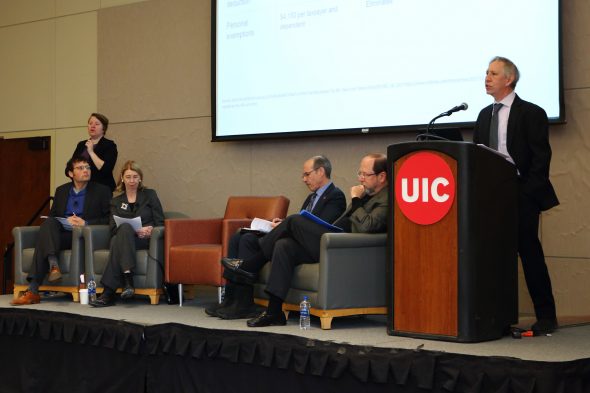Campus Conversation examines tax code rewrite

The Campus Conversation series convened experts Feb. 7 at Student Center East to sort out the massive 1,000-page rewrite of the tax code in a discussion titled “What is the Tax Reform Act and Why Does It Matter?” Photo: Jenny Fontaine
The passage of the Tax Cuts and Jobs Act in late December forced employers to quickly implement new withholding rates and left individual filers unsure about its impact on their tax status.
The Office of the Provost’s Campus Conversation series convened experts Feb. 7 at Student Center East to sort out the massive 1,000-page rewrite of the tax code in a discussion titled “What is the Tax Reform Act and Why Does It Matter?”
The specialists addressed an array of issues, including the plan’s likely impact on standard deduction filing, mortgage and property tax deductions, retirement savings and local government.
“There’s going to be wide-spread agreement among economists that lower marginal tax rates do less to discourage work — or less to discourage earning income — than higher tax rates,” said moderator David Merriman, James J. Stukel Presidential professor and professor of public administration.
Post-passage of the law, uncertainty surrounds its efficiency, equity and what behavioral responses from households and businesses will transpire.
Something has to give when tax cuts are provided, said Robert Chirinko, professor of finance.
“Either spending must decrease, which would be a problem because the government has a number of things it needs to do supporting education, research, infrastructure and so on,” he said. “Deficits might have to increase; therefore, there will be less funds for borrowing for things like student loans.”
About one-quarter of all tax forms file using itemized deductions, but that is expected to drop to around 10 percent under the new legislation, according to Erik Hembre, assistant professor of economics, who says the tax cut takes the “legs out” of the mortgage interest deduction.
“Partially by lowering the maximum amount of mortgage interest that you can deduct, but mostly through the fact a lot fewer people are going to be itemizing their deduction and as a result getting a benefit from the mortgage interest deduction,” he said.
Hembre also considers the $10,000 cap on state and local government property tax deductions a progressive move that skews to affect higher income earners.
Overall, the tax code changes appear to shrink the economic pie, which favors the upper income groups.
“If we thought of inequality as a problem going into this, it’s going to be even more of a problem going out,” Chirinko said.
Retirement plans serve as the prime savings vehicle for the average worker, said Kathryn Kennedy, professor and director of the Center for Tax Law and Employee Benefits at John Marshall Law School.
“To the extent it is reduced or the interest on it is altered, we’re all going to be hurting,” she said. “And we all know Social Security may not be the safety net we thought it would be.”
Michael Pagano, dean of the College of Urban Planning and Public Affairs, cautioned that issues will arise at the state and local level, where governments provide the protection of life and property.
“Be careful what you wish for, because what is most vulnerable are the social service programs, the health programs, Medicare, housing, and support for the poor,” he said. “We are in for a bitter battle about the survival and soul of state and local governments in the United States.”
The panelists agreed that major tax reform in the near future is unlikely due to historical precedence and current lack of bipartisanship among lawmakers.
Kennedy called the latest act a “very rushed” piece of tax legislation.
“If we learn anything from history, we’ll discover that it’ll have unintended consequences because they don’t have all the right people in the room at the time,” she said.
